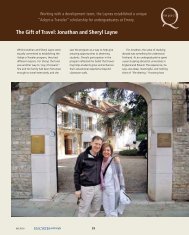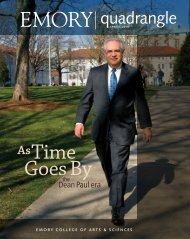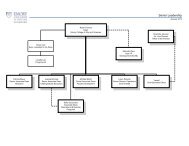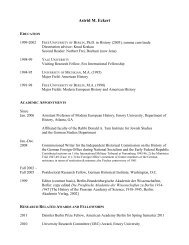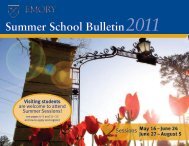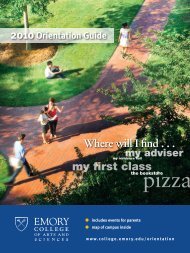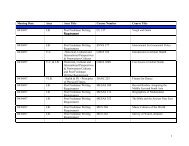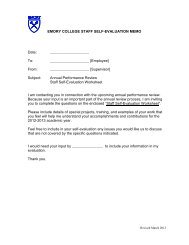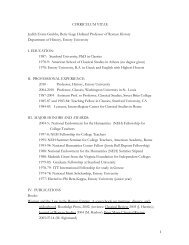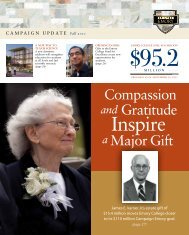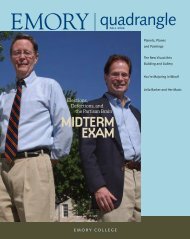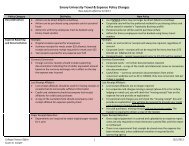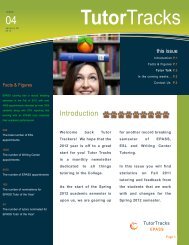2012 Summer School Bulletin - Emory College - Emory University
2012 Summer School Bulletin - Emory College - Emory University
2012 Summer School Bulletin - Emory College - Emory University
You also want an ePaper? Increase the reach of your titles
YUMPU automatically turns print PDFs into web optimized ePapers that Google loves.
164-00A. TAI CHI<br />
8:30–9:50 a .m . Daily . 1st session . Credit, 1 hr . Young<br />
This course teaches the history, philosophy, and physical performance of the ancient Chinese<br />
martial art of tai chi chuan. Topics covered include stress management through moving<br />
meditation, physical and mental balance, strength building, flexibility, and traditional Chinese<br />
medical theory. Learn 10 forms of Yang-style tai chi chuan. MAX: 22<br />
167-00C. BEGINNING YOGA<br />
10:00–11:20 a .m . Daily . 2nd session . Credit, 1 hr . Doherty<br />
Yoga exercise and breathing are designed to focus and calm your mind while stretching<br />
and strengthening your body. The course starts with simple techniques and gradually<br />
progresses until the student learns to design his or her own program to relax, increase<br />
energy, or cope with stress and illnesses. Classes normally consist of exercise as well as<br />
discussion about the techniques and philosophy of yoga. The instructor adapts exercises<br />
to individual needs. Class meets in WPEC aerobics studio, 4th floor. MAX: 22<br />
173-00C. BEGINNING TENNIS<br />
11:30 a .m .–12:50 p .m . Daily . 2nd session . Credit, 1 hr . England<br />
Beginning class, no experience necessary. Students who have had tennis experience should not<br />
register for the course. Emphasis on ground strokes, serve, return of serve, scoring, and singles<br />
and doubles match play. Students must provide their own tennis racquets. Class meets at the<br />
WPEC indoor/outdoor tennis courts. First class meets at the indoor courts, 4th floor. MAX: 18<br />
Course Number Key and Dates<br />
00A: First session May 21 – June 29 00F: Miscellaneous Varies<br />
00B: Entire summer May 21 – August 10 0PA, 0PB, 0PC Permission required<br />
00C: Second Session July 2 – August 10<br />
MAY: Maymester May 15–June 1<br />
History<br />
201-00A. FORMATION OF EUROPEAN SOCIETY<br />
10:00–11:20 a .m . Daily . 1st session . Credit, 4 hrs . Leinweber<br />
Examines the early forms of those societies that came to dominate the European continent<br />
and explores their early expansion and influence. Topics treated include the heyday and<br />
demise of Classical civilization; the spread and influence of Christianity; the formation<br />
of European countries and peoples; the Crusades; the medieval synthesis (feudalism,<br />
manorialism and the Church); medieval learning; the new geography; the Renaissance; the<br />
Reformation. Required Textbook: R. R. Palmer, Joel Colton, Lloyd Kramer, A History of<br />
the Modern World, Tenth Edition<br />
202-00A. THE MAKING OF MODERN EUROPE<br />
11:30 a .m .–12:50 p .m . Daily . 1st session . Credit, 4 hrs . Leinweber<br />
Examines major themes in European history during the modern era, roughly mid-17th<br />
century to the present; special attention to conflicts in economic, political, social, and<br />
intellectual life. Topics treated include: Absolutism–Stuart England, Hapsburg Central<br />
Europe, and Bourbon France; the French Revolution and Napoleon; the Restoration; the<br />
Industrial Revolution; nation-state formation; World War I; World War II; the post-war<br />
paradigm. Required Textbook: R. R. Palmer, Joel Colton, Lloyd Kramer, A History of the<br />
Modern World, Tenth Edition.<br />
203-00C. THE WEST IN WORLD CONTEXT<br />
10:00–11:20 a .m . Daily . 2nd session . Credit, 4 hrs . Payne<br />
This course will concentrate on the emergence and consequences of Europe’s rise to and<br />
decline from global hegemony in the half millennium from 1500–2000. It will explore the<br />
causes and consequences of this historical trajectory with the emphasis on Europe, rather<br />
than the world. In other words, this is not a “world history” course but a history of Europe<br />
in the world. Discrete topics such as the medieval roots of European expansionism, the age of<br />
discovery, commodities and Empire, the impact of Revolution, the “new” Imperialism, world<br />
wars, the Cold War, decolonization and globalization are all addressed. Although different<br />
topics will highlight different European countries, the texts and lectures will try to take a<br />
broad view of the topic. As a course that serves a General Education Requirement (HSC), it is<br />
<strong>Summer</strong> <strong>School</strong> <strong>Bulletin</strong> Courses | 25 www.college.emory.edu/summer



